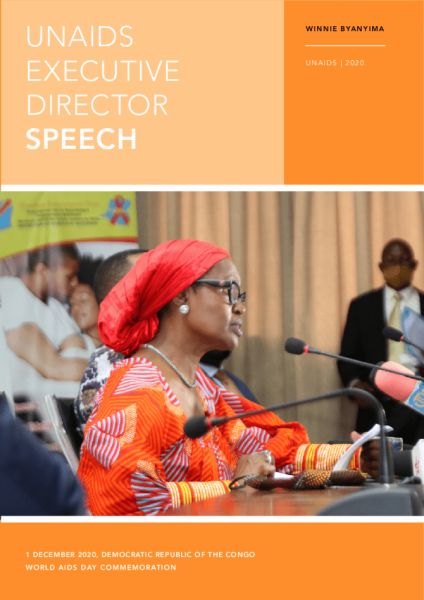On World AIDS Day, the UNAIDS Executive Director visited an HIV community village and a children’s hospital
Kinshasa, 2 December 2020—UNAIDS Executive Director Winnie Byanyima visited an HIV community village in Kinshasa as part of the World AIDS Day ceremonies in the capital of the Democratic Republic of the Congo. She commended the country on its vast experience in responding to pandemics such as Ebola after the country announced the end of the latest Ebola outbreak on 18 November.
“I thank the Congolese government, our friends from civil society and partners who together have enabled the country to respond to its many challenges, particularly HIV, Ebola and now COVID-19,” said Ms Byanyima.
Ms Byanyima stressed that more people in the country need life-saving HIV treatment and that more needs to be done to support women in particular. “Despite considerable progress, only 57% of people living with HIV are on antiretroviral therapy,” Ms Byanyima said. “Coverage of antiretroviral therapy is higher among men (72%) than among women (51%), a real sign of gender inequality.” She added that if women do not feel safe to disclose their HIV status or feel that they will be supported or accepted if they are living with HIV, they will not enrol onto HIV treatment.
Out of the 520 000 people living with HIV in the Democratic Republic of the Congo, more than 64% are women. There are 68 000 children under the age of 14 years who are living with HIV in the country, of whom only 25% are on treatment, which is why Ms Byanyima called on the country to accelerate paediatric care, including HIV services.
At the Kalembelembe Children’s Hospital she spoke to staff and adolescents who have grown up accessing care and support at its paediatric centre. The adolescents asked the Executive Director to continue to advocate for funding to maintain peer support groups for adolescents living with HIV, the elimination of user fees, the inclusion of all adolescents living with HIV in education and the elimination of legal barriers requiring parental consent for HIV testing for adolescents.
HIV in the Democratic Republic of the Congo, like in the rest of sub-Saharan Africa, particularly affects young women. Ms Byanyima reiterated that to end AIDS, the focus must be put on women and girls. “Every week, 4500 young women in sub-Saharan Africa are infected with HIV,” she said. “This is unacceptable, we need to make a radical difference in the response to HIV.”
Upon her arrival in Kinshasa, Ms Byanyima met with the Minister of Health, Eteni Longondo. She congratulated him on his leadership in responding to COVID-19 and shared her concerns about keeping HIV at the top of the agenda, despite the multitude of pressures of the three colliding pandemics of Ebola, HIV and COVID-19.
AIDS-related deaths in the Democratic Republic of the Congo have dropped by 61% in the past 10 years, from 37 000 in 2010 to 15 000 in 2019. HIV prevalence hovers around 1% among adults, but 23 000 people became newly infected with HIV last year.
Bold ambitious targets
UNAIDS’ new report, Prevailing against pandemics by putting people at the centre, calls on countries to make far greater investments in global pandemic responses and to adopt a new set of bold, ambitious but achievable HIV targets. If those targets are met, the world will be back on track to ending AIDS as a public health threat by 2030.
The global AIDS response was off track before the COVID-19 pandemic hit, but the rapid spread of the coronavirus has created additional setbacks. Modelling of the pandemic’s long-term impact on the HIV response shows that there could be an estimated 123 000 to 293 000 additional new HIV infections and 69 000 to 148 000 additional AIDS-related deaths between 2020 and 2022.
“The collective failure to invest sufficiently in comprehensive, rights-based, people-centred HIV responses has come at a terrible price,” said Winnie Byanyima, Executive Director of UNAIDS. “Implementing just the most politically palatable programmes will not turn the tide against COVID-19 or end AIDS. To get the global response back on track will require putting people first and tackling the inequalities on which epidemics thrive.”
Getting back on track
Although some countries in sub-Saharan Africa, such as Botswana and Eswatini, have done remarkably well and have achieved or even exceeded the HIV targets set for 2020, many more countries are falling way behind. The high-performing countries have created a path for others to follow. UNAIDS has worked with its partners to distil those lessons into a set of proposed targets for 2025 that take a people-centred approach.
The targets focus on a high coverage of HIV and reproductive and sexual health services together with the removal of punitive laws and policies and on reducing stigma and discrimination. They put people at the centre, especially the people most at risk and the marginalized—young women and girls, adolescents, sex workers, transgender people, people who inject drugs and gay men and other men who have sex with men.
New HIV service delivery targets aim at achieving a 95% coverage for each sub-population of people living with and at increased risk of HIV. By taking a person-centred approach and focusing on the hotspots, countries will be better placed to control their epidemics.
The 2025 targets also require ensuring a conducive environment for an effective HIV response and include ambitious antidiscrimination targets so that less than 10% of countries have punitive laws and policies, less than 10% of people living with and affected by HIV experience stigma and discrimination and less than 10% experience gender inequality and violence.



